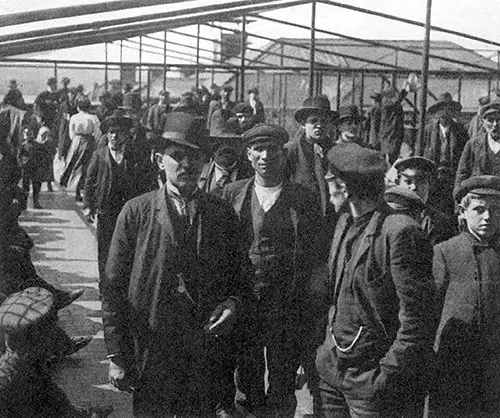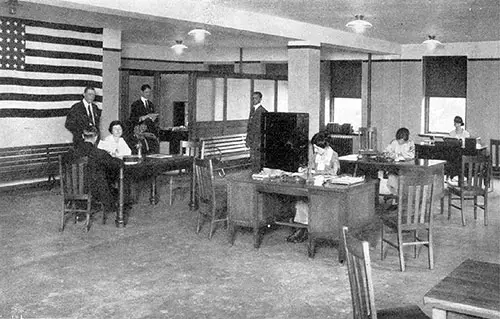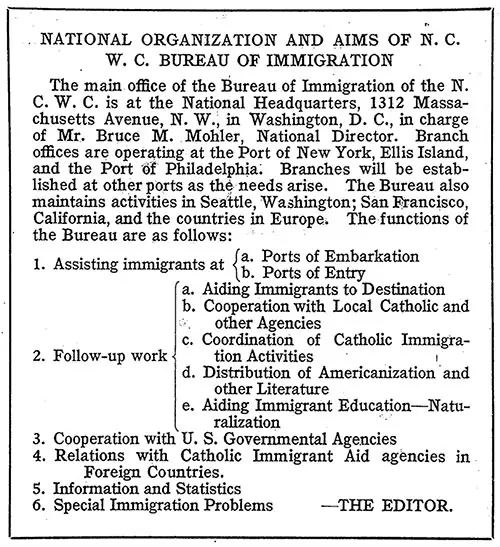America's International Clearinghouse: Ellis Island's Immigration Task and N.C.W.C.'s Humanitarian Efforts (1921)
Ellis Island's Immigration Task and the N. C. W. C.'s Part in It
📌 This 1921 article explores the intricate process of immigration at Ellis Island, detailing the role of the National Catholic Welfare Council in assisting immigrants and providing a humanistic perspective on the challenges of the immigration experience during the early 20th century.
America's International Clearinghouse - 1921
Relevance to Immigration Studies
The article America's International Clearinghouse provides an insightful and detailed overview of the operations at Ellis Island during the peak of immigration in 1921, focusing on the critical role of the National Catholic Welfare Council (N.C.W.C.) in assisting immigrants.
This article is an invaluable resource for teachers, students, genealogists, historians, and immigration scholars, offering a deeper understanding of the immigration process at Ellis Island and the humanitarian efforts that aimed to alleviate some of the challenges faced by immigrants.
The article not only presents the logistical operations of immigration but also addresses the social, medical, and emotional dimensions of the immigrant experience at this iconic entry point to America.
By T. F. Mulholland, Port Director, New York, N. C. W. C. Immigration Bureau

Immigrants Held Under Detention at Ellis Island. © Underwood & Underwood. The NCWC Bulletin, September 1921. | GGA Image ID # 14d0cd730b
As approximately 70 percent of the Nation's immigration is handled on Ellis Island, it is clear that the above title may fittingly be applied to this entrance to the New World.
Even with what has been described as a significant slump in immigration, 648,651 aliens arrived at the port of New York in the twelve months ending June 30, 1921, an average of 12,474 per week during the entire period.
No reading about the number of arrivals at Ellis Island will give a fair idea of what this volume of immigration means, nor of what sort the immigrants are.
For that, one must see the human stream pouring upon the wharf of the Island out of the barges that have brought the immigrants from the steamships that have been their floating homes in their long passage across the Atlantic.
The gigantic task confronting the Immigration Officials is sufficiently arduous in itself. Still, it becomes almost impossible when complicated by the difficulties caused by the unsuppressed anxiety of those whose only aim is to secure the immediate admission of their alien relatives into the country, whatever the impediments and however clearly expressed the debarring statutes.
It is probably advisable to give a general idea of the method of admission of aliens as carried out on Ellis Island to assist immigrants indirectly through their relatives and friends.
Method of Receiving Aliens
All 3,162 immigrants were brought to Ellis Island from steamship piers on barges or small steamboats and, upon arrival, underwent a medical examination by officers of the United States Public Health Service.
This examination is held on the ground floor and is not open to public inspection. It relates to the detection of loathsome and dangerous contagious diseases and to any diseases or physical defects that may, in any way, affect the immigrant's ability to earn a living.
Public Health Officers must also detect insanity, idiocy, imbecility (stupidity), and feeble-mindedness. They report all physical and mental defects to Immigration Officials for appropriate action under the law.
Immigrants suffering from serious diseases and those requiring general medical care are sent directly to the hospital. Upon completion of the medical examination, all others present themselves on the main floor for inspection.
The Immigrant Inspectors sit at the end of long lines, assisted when necessary by interpreters. They have before them the ship's manifest sheets containing information concerning the immigrant, including name, age, occupation, nationality, last place of residence, final destination, and other matters required by law to be registered by the steamship companies.
These inspectors also apply the literacy test required of all immigrants, which is made in the language requested by the individual. It is arranged that immigrants appear before that particular inspector who has the manifest sheet on which they are listed and who also has before him any medical certificate that may have been issued.
With the preceding information and the opportunity to question the immigrants thoroughly, it is the inspector's duty (often difficult) to determine who amongst the immigrants presents doubtful cases under the law and hold such cases for inspection by a board of special inquiry.
Most other immigrants are allowed to land at once, except that women and children going to New York or the vicinity are temporarily detained in the Information Division until called for by relatives or friends.
When immigrants are suffering from any of the mental defects already named or from any loathsome or dangerous contagious disease, exclusion follows the issuance of a medical certificate as a matter of course.
In other cases, the question of whether or not an immigrant should be excluded may be very difficult, such as determining whether he is likely to become a public charge or whether certain physical defects (not of a loathsome or contagious nature) will affect his ability to earn a living.
These points occupy the attention of the various boards of Special Inquiry, appointed daily by the Commissioner. Several of these are in session throughout each day. The boards are composed of three inspectors and have the power to admit or exclude.
In most cases, an appeal from these excluding decisions lies through the Commissioner to the Secretary of Labor. By statute, the Special Inquiry Board sessions are closed to the general public.
Worthy Immigrants Admitted
It may be worth mentioning that despite harrowing stories periodically finding their way into the public press, immigrants are not turned back from our shores for want of a dollar to make up the amount required for their prospective journey.
If such situations should occur in the case of a worthy immigrant, there are individuals and agencies on Ellis Island who would not hesitate to supply the deficiency, and it is but universal justice to a much-maligned body of men in these days of sensational newspaper articles, to state that in very many financial transactions between Government authorities and immigrants, the path of the welcome dollar has been from and not into the pocket of the Immigration Officer.
The law is silent on the question of the amount of money an immigrant should have in his possession. Still, the authorities usually require him to have enough to provide for his reasonable wants until he is located.
Many immigrants were allowed to land and travel to the interior by rail. They descended the stairway to what is known as the "Railroad Rooms," from where they proceeded to the various railway terminals on the Jersey shore.
In the first railroad room, the immigrant cashes his landing check and may exchange his foreign money at rates daily posted in full view of all, obtaining a receipt for the money given (exchanged).
He then purchases his railroad ticket and proceeds to the second railroad room, where he is "tagged" with a number showing the railroad over which he is to travel.
While awaiting transportation by the ferry, he may obtain, at reasonable rates, light refreshments and a luncheon box, the contents and price of which are a source of constant wonder to visitors from New York and elsewhere.
Detention of Immigrants
Those immigrants who have appeared before the Boards of Special Inquiry and have been excluded are transferred to the Detention Quarters, where they await deportation or, if they have appealed against the Board's decision, the result of such appeal.
Opportunities for sympathetic and appreciated social service present themselves among those so detained, for, in many cases, days and often weeks pass before the order for admission arrives or the bonds guaranteeing the immigrant against becoming a public charge reach the Immigration officials.
Also, on many occasions, the appeal is fruitless. Speaking cheering words of comfort, which will remove the pangs of disappointment, is by no means easy, though very necessary and effective in the long run.
All phases of social welfare work receive their share of attention from the N. C. W. C. Bureau of Immigration workers on Ellis Island. Special attention is given to detained immigrants whose gratitude is shown in their words of acknowledgment of the benefits received from the daily visits of the workers.
Advice to Relatives of Immigrants

Interior View of the Port Office, N. C. W. C. Bureau of Immigration, 61 Whitehall Street, New York City. The N. C. W. C. Bulletin, September 1921. | GGA Image ID # 14d10317ce
The National Catholic Welfare Council's Bureau of Immigration has been established to render moral and material assistance to immigrants. It is often a needless expense for relatives to come from a distance and wait for days to land those they are interested in.
It is sufficient to send word in advance to the Bureau of Immigration at the National Headquarters of the N. C. W. C. in Washington, D. C., giving all necessary information, name of immigrant, age, sex, nationality, name of steamship, class of travel, name, and address of person to whom destined, and such other details as might facilitate landing.
This information will be forwarded to the branch offices at the respective ports. The immigrant will then be taken care of, and word will be sent to his destination informing his friends there of his departure from the port so that he may be met at the end of his journey.
In cases where relatives' presence at Ellis Island is necessary, they will be notified. Pending their arrival, the immigrants will be carefully looked after, and everything will be done to ensure their comfort.
Where an immigrant is excluded and an appeal is necessary, a word of warning will not come amiss. Runners, pretending to have special facilities for securing immediate admission for immigrants, prey upon ignorant and unsuspecting relatives, demanding large sums of money in return for their services.
No bargains should be made with these despicable individuals. All information concerning cases detained at Ellis Island should be sent to the Port Director at New York, No. 61 Whitehall Street, and representatives of the N. C. W. C. will make all inquiries, lodging an appeal for the immigrant, if worthy, and advising if there will be any material advantage in obtaining the services of a reputable lawyer whose fees are not gauged by an estimate of the possible life savings of the relatives.
Many cases of graft may be traced to the guilelessness of people seeking the admission of relatives into the country and who part with their hard-earned money to glib casual acquaintances, most of whose work is completed with the financial fleecing of their victims.
The Government authorities are anxious to check these adventurers' activities. Readers can cooperate by warning against the methods adopted in exploiting the immigrant or his friends, either at the ports of entry or elsewhere in the United States.

National Organization and Aims of the N. C. W. C. Bureau of Immigration. The N. C. W. C. Bulleting, September 1921. | GGA Image ID # 14d1215257
T. F. Mulholland, "America's International Clearing-House: Ellis Island's Immigration Task and the N. C. W. C.'s Part in It," in The National Catholic Welfare Council Bulletin, Washington, DC: The National Catholic Welfare Council, Vol. III, No. 4, September 1921, pp. 6-8.
Key Highlights and Engaging Content
Ellis Island’s Immigration Task
The article provides a quantitative glimpse into the sheer scale of immigration handled at Ellis Island, with 648,651 immigrants arriving at the port of New York in 1921 alone.
The emphasis on the human stream of immigrants arriving from steamships paints a vivid picture of the volume and diversity of individuals entering the country.
The accompanying image of immigrants held under detention serves as a stark visual reminder of the challenges and complexities faced by immigration authorities during this time. 🛳️👥
Detailed Process of Immigration
The method of receiving aliens on Ellis Island is carefully outlined, focusing on the multi-step process that each immigrant underwent. From the medical examination to the literacy test, each stage is scrutinized to determine eligibility for entry.
The article also discusses how immigration inspectors, aided by interpreters, worked diligently to ensure the fair treatment of all immigrants, despite the overwhelming pressures of their task. For educators and students, this breakdown offers a comprehensive view of the bureaucratic processes of immigration during the period. 🏥📋
Role of the National Catholic Welfare Council (N.C.W.C.)
A central theme of the article is the critical humanitarian work undertaken by the N.C.W.C. to assist immigrants. The N.C.W.C. not only offered moral and material assistance but also played a vital role in navigating legal and procedural challenges for immigrants.
The article highlights how the N.C.W.C. helped immigrants by providing financial support in cases where immigrants lacked the necessary funds for their journey or living expenses, as well as offering support in appeals against exclusion decisions.
For genealogists and historians, this insight into the social welfare efforts surrounding immigration is invaluable. 🤝🏽💰
Detention and Deportation Process
The article doesn’t shy away from discussing the darker side of immigration procedures, such as the detention of immigrants who were either excluded or awaiting the results of their appeals.
It provides a realistic portrayal of the emotional strain and the hardships of being detained in poor conditions for days, sometimes weeks. The humanitarian work of the N.C.W.C. workers in these situations is highlighted as essential in maintaining the dignity of immigrants.
This section is particularly valuable for students and historians studying the broader societal impact of immigration policies. 🚨💔
Advice to Immigrant Families and Prevention of Exploitation
One of the more practical aspects of the article is the advice given to the families of immigrants. It emphasizes the importance of avoiding exploitation by fraudulent immigration runners who prey on unsuspecting relatives of detained immigrants.
This preventative guidance underscores the ethical concerns surrounding the immigrant experience and highlights the N.C.W.C.'s role in protecting vulnerable populations from exploitation. For those researching immigration law and social work, this information offers an important historical context. ⚖️💼
Educational and Historical Insights
Ellis Island as a Symbol of America’s Immigration Policies: The article serves as an essential resource for those studying the evolution of immigration policies in the United States, particularly the tensions between economic need, health concerns, and the human toll these policies took on immigrants. It also offers insight into the social welfare roles that organizations like the N.C.W.C. played in bridging the gap between government policies and immigrant needs.
Humanitarianism Amidst Bureaucracy: The article sheds light on how immigration was not merely a bureaucratic process but also one that demanded empathy and humanitarian attention.
The N.C.W.C.'s efforts to offer moral support and material assistance underscore the importance of compassion in immigration policies, something that remains relevant in today's debates over immigration.
Impact of Immigration on Families: The focus on family reunification, and the emotional cost of being separated or detained at Ellis Island, provides a clear historical example of how immigration processes shaped the lives of immigrant families.
For genealogists, understanding the family dynamics and struggles during this era can provide a deeper context for tracing immigrant ancestors. 👨👩👧🌍
Final Thoughts
America's International Clearinghouse (1921) offers a nuanced and comprehensive view of Ellis Island's role in the immigration process and the efforts made by the National Catholic Welfare Council to ease the burdens faced by immigrants.
The article’s historical relevance is immense, as it highlights not only the bureaucratic structure of immigration but also the human side—showing how organizations and individuals worked to provide dignity and support to those navigating a complex and often hostile system.
For immigration scholars, teachers, students, and historians, this article serves as a poignant reminder of the struggles and triumphs that defined the immigrant experience at Ellis Island, emphasizing the importance of social justice in the immigration process.
🔎 Research & Essay Writing Using GG Archives
📢 This is NOT a blog! Instead, students and researchers are encouraged to use the GG Archives materials for academic and historical research.
🔎 Looking for primary sources on Titanic’s lifeboat disaster? GG Archives provides one of the most comprehensive visual collections available today.
